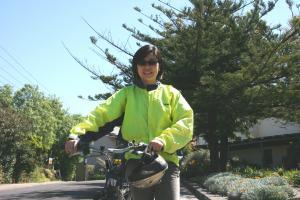
Thousands of Melburnians will celebrate Ride to Work day next week but few of them will be migrants or refugees.
New research by Victoria University community development academic Dr Siewfang Law has revealed migrants and refugees are not only riding much less than other Melburnians, they are riding much less than they used to in their home countries.
Dr Law surveyed more than 400 Japanese, Vietnamese, Sri Lankan and Arab-African people living in Melbourne and found they were riding, on average, eight times less often here than they had back home.
Vietnamese migrants rode their bikes 24 times less often since arriving in Australia.
Dr Law said fear of riding on our roads was the chief factor behind their behaviour change.
"The notion of cycling on roads was perceived as dangerous for many of them, especially due to the greater speed of vehicles and the way bicycle lanes operate," Dr Law said.
This was particularly true for the Japanese, who were used to riding bicycles on the footpaths in Japan.
Dr Law said the notion of safe cycling differed greatly between cultures.
"Many of these newly arrived migrants feel safer riding bicycles in their home countries, even with less safety features such as wearing helmets, using bicycle lights and wearing reflective jackets in the dark," she said.
"But at home they are happy to ride with an umbrella in one hand, carrying groceries and riding with their children."
Dr Law said more off-road bicycle paths and rider education for multicultural groups would help them join in the city's cycling boom.
Those surveyed also complained about the start-up costs involved with cycling in Melbourne, with some explaining that cycling here was "socially exclusive" and even "elitist" due to the specialised clothing and equipment.
Many newly-arrived migrants and refugees said high property prices meant they lived too far away from the inner city to ride, while some respondents also mentioned cultural reasons for not riding, especially Arab-African women.
Dr Law recommended organised riding events at cultural festivals, the promotion of cycling in different languages and having community leaders and women's groups organise collective cycling events.
The study Social Inclusive Bicycle Riding in Multicultural Australia was completed in collaboration with Bicycle Victoria and funded by the Scanlon Foundation.
